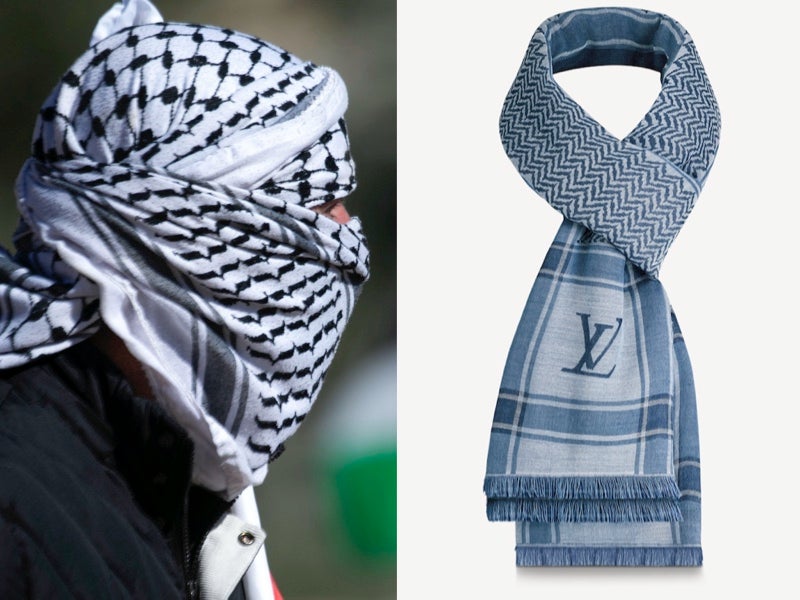Louis Vuitton faces accusations of cultural appropriation over $705 scarf inspired by Palestinian keffiyeh
French fashion house describes scarf as ‘timeless accessory’ that ‘creates an easygoing mood’

Your support helps us to tell the story
From reproductive rights to climate change to Big Tech, The Independent is on the ground when the story is developing. Whether it's investigating the financials of Elon Musk's pro-Trump PAC or producing our latest documentary, 'The A Word', which shines a light on the American women fighting for reproductive rights, we know how important it is to parse out the facts from the messaging.
At such a critical moment in US history, we need reporters on the ground. Your donation allows us to keep sending journalists to speak to both sides of the story.
The Independent is trusted by Americans across the entire political spectrum. And unlike many other quality news outlets, we choose not to lock Americans out of our reporting and analysis with paywalls. We believe quality journalism should be available to everyone, paid for by those who can afford it.
Your support makes all the difference.Louis Vuitton is facing accusations of cultural appropriation over a $705 scarf inspired by the Palestinian keffiyeh and sold by the luxury designer.
On the French fashion house’s website, where the Monogram Keffieh Stole is listed, it describes the accessory as: “inspired by the classic Keffieh and enriched with House signatures.”
“A jacquard weave technique is used to create the intricate Monogram patterns on its base of blended cotton, wool and silk. Soft and lightweight with fringed edges, this timeless accessory creates an easygoing mood,” the product’s description continues.
However, many have since accused Louis Vuitton of “profiting off oppressed people” and failing to acknowledge the importance of the scarf as a symbol of Palestinian nationalism.
“It is so disrespectful to sell the symbol of Palestinian culture, the keffiyeh for a ridiculous amount of $705, without acknowledging that it belongs to Palestinian culture,” one person tweeted. “At least acknowledge the Palestinian people and their struggle. Talk about appropriation.”
Another person wrote: “Louis Vuitton says they are politically neutral yet they are getting profits from the sale of this $705 keffiyeh inspired scarf usually worn by the Arabs and a symbol of Palestinian nationalism. And the colour, is that some form of passive political commentary?”
The potential meaning behind the scarf’s blue and white colours was one raised by numerous critics, with many questioning whether the brand had purposely chosen the colours of Israel’s flag for the accessory.
The criticism was also shared by watchdog Instagram account DietPrada, which uploaded a series of photos comparing the Louis Vuitton scarf and the traditional keffiyeh and wrote: “So LVMH’s stance on politics is ‘neutral,’ but they’re still making a $705 logo-emblasoned keffiyeh, which is a traditional Arab headdress that’s become a symbol of Palestinian nationalism. Hmmmm…”
As noted by Insider, the caption appears to reference a 21 May post shared by DietPrada, in which the account said a source at LVMH, which owns Louis Vuitton and Dior, had said that the company’s “stance on politics is neutral” and that it would not be cancelling Bella Hadid’s contract over her outspoken support for Palestine amid ongoing Israeli-Palestinian violence in the Middle East.
DietPrada’s latest post about the controversy sparked further backlash among social media users, with many attacking the luxury brand over what one person referred to as a “whole different level of disrespect”.
“Louis Vuitton is like ‘we won’t comment on politics but we’ll capitalise on it,’” one person commented, while another said: “They could have designed a regular scarf, I’m not sure why they felt the need to specifically take from someone else’s culture?? It’s not even an innocent mistake or coincidence, they know where it comes from.”
This is not the first time the use of the scarf’s print in fashion has been met with criticism, as Omar Joseph Nasser-Khoury, a Palestinian fashion designer, previously told The Guardian that the use of the keffiyeh, which symbolises “dispossession, systematic displacement, extrajudicial killings [and] oppression,” by designers is “irresponsible”.
“It’s almost disrespectful and it’s exploitative,” he said.
At the time, Amani Hassan, programme director at The Arab British Centre, told the outlet that the design’s use in fashion also means it “loses its original meaning” and “normalises the occupation”.
The Independent has contacted LVMH for comment.



Join our commenting forum
Join thought-provoking conversations, follow other Independent readers and see their replies
Comments